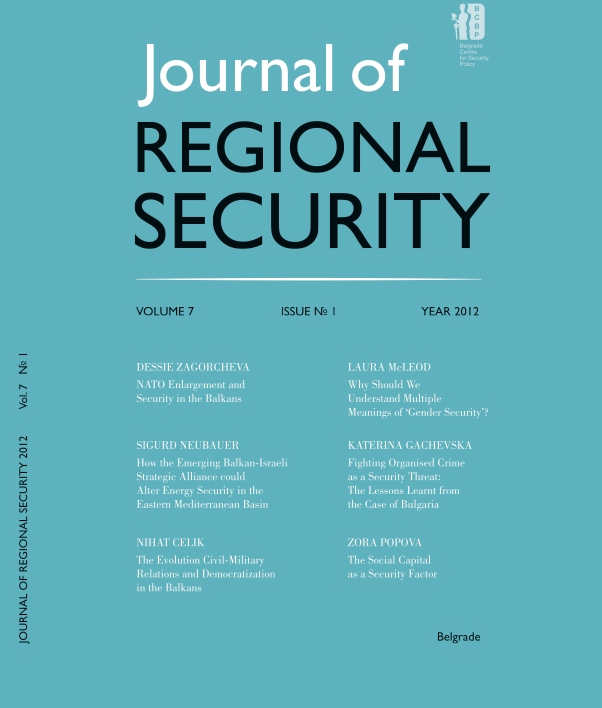The Evolution Civil-Military Relations and Democratization in the Balkans
Abstract
Following the dissolution of the Soviet Union and Yugoslavia, in addition to the political and economic orders, the structure of civil-military relations also began to change. The paper will provide an insight into the patterns of civil-military relations from a historical perspective. The main argument of the paper is that even though serious and mostly successful first generation reforms are made in the field of democratic civil-military relations, there are still some problems regarding the second generation reforms. In order to address these problems, the evolution of civil-military relations in the post-Communist era will be analyzed with a focus on successes and failures. After sorting out current problems, it will secondly try to answer the question what should be done in order to establish a more democratic structure of civil-military relations.
References
Abrahamsson, Bengt. 1972. Military Professionalization and Political Power. London: Sage Publications.
Barany, Zoltan. 1997. “Democratic Consolidation and the Military: The East European Experience”. Comparative Politics 30 (1): 21–43.
Born, Hans, Marina Caparini, Karl W. Haltiner, and Jürgen Kuhlman. 2006a. “Civilians and Military in Europe.” In Civil-Military Relations in Europe: Learning from crisis and institutional change, edited by Hans Born, Marina Caparini, Karl W. Haltiner, and Jürgen Kuhlman, 3–17. London: Routledge.
Born, Hans, Marina Caparini, Karl W. Haltiner, and Jürgen Kuhlman. 2006b. “Patterns of Democratic Governance of Civil-Military Relations.” In Civil-Military Relations in Europe: Learning from crisis and institutional change, edited by Hans Born, Marina Caparini, Karl W. Haltiner, and Jürgen Kuhlman, 235–255. London: Routledge.
Cottey, Andrew, Timothy Edmunds and Anthony Forster. 2002a. “Introduction: the Challenge of Democratic Control of Armed Forces in Postcommunist Europe.” In Democratic Control of the Military in Postcommunist Europe: Guarding the Guards, edited by Andrew Cottey, Timothy Edmunds and Anthony Forster, 1–17. London: Palgrave.
Cottey, Andrew, Timothy Edmunds and Anthony Forster. 2002b. “The Second Generation Problematic: Rethinking Democracy and Civil-Military Relations.” Armed Forces & Society 29 (1): 31–56.
Gallagher, Tom. 2003. The Balkans After the Cold War: From Tyranny to Tragedy. London: Routledge.
Herd, Graeme P., and Tracy Tom. 2006. “Democratic Civil-Military Relations in Bosnia and Herzegovina: a New Paradigm for Protectorates?” Armed Forces & Society 32 (4): 549–565.
Huntington, Samuel P. 1957. The Soldier and the State: The Theory and Politics of Civil- Military Relations. Cambridge: The Belknap Press of Harvard University Press.
Janowitz, Morris. 1960. The Professional Soldier: A Social and Political Portrait. London: The Free Press of Glencoe Collier–Macmillan Ltd.
Johnson, Mae M. 1995. “Civil-Military Relations and Military Reform in Bulgaria.” European Security 4 (3): 488–518.
Jones, Christopher D., and Mychajlyszyn Natalie. 2002. “Overview: Civil-Military Relations in Central and Eastern Europe in Former Communist Societies.” Armed Forces & Society 28 (3): 375–384.
Nelson, Daniel N. 2002. “Armies, Security, and Democracy in Southeastern Europe.” Armed Forces & Society 28 (3): 427–454.
OSCE. 1994. Code of Conduct on Politico-Military Aspects of Security. Accessed 22 August 2011. http://www.osce.org/fsc/41355.
Pantev, Plamen. 2002. “The Changing Nature of Civil-Military Relations in Post-Totalitarian Bulgaria.” In Democratic Control of the Military in Postcommunist Europe: Guarding the Guards, edited by Andrew Cottey, Timothy Edmunds and Anthony Forster, 140–158. London: Palgrave.
Pond, Elizabeth. 2006. Endgame in the Balkans: Regime Change, European Style. Washington, D.C: Brookings Institution Press.
Sava, Ionel N. 2002. “Western (NATO/PfP) Assistance to Build Democratic Civil-Military Relations in South Eastern Europe: The case of Bulgaria, Romania and Slovenia.” Final Report, the Manfred Wörner Fellowship 2001–2002, Bucharest.
Zulean, Marian. 2004. “Changing Patterns of Civil-Military Relations in Southeastern Europe.” Mediterranean Quarterly 15 (2): 58–82.
Authors retain copyright of the published papers and grant to the publisher the non-exclusive right to publish the article, to be cited as its original publisher in case of reuse, and to distribute it in all forms and media.
The published articles will be distributed under the Creative Commons Attribution 4.0 International License (CC BY). It is allowed to copy and redistribute the material in any medium or format, and remix, transform, and build upon it for any purpose, even commercially, as long as appropriate credit is given to the original author(s), a link to the license is provided and it is indicated if changes were made. / The published articles will be distributed under the Creative Commons Attribution ShareAlike 4.0 International license (CC BY-SA). It is allowed to copy and redistribute the material in any medium or format, and remix, transform, and build upon it for any purpose, even commercially, as long as appropriate credit is given to the original author(s), a link to the license is provided, it is indicated if changes were made and the new work is distributed under the same license as the original.
Users are required to provide full bibliographic description of the original publication (authors, article title, journal title, volume, issue, pages), as well as its DOI code. In electronic publishing, users are also required to link the content with both the original article published in Journal of Regional Security and the licence used.
Authors are able to enter into separate, additional contractual arrangements for the non-exclusive distribution of the journal's published version of the work (e.g., post it to an institutional repository or publish it in a book), with an acknowledgement of its initial publication in this journal.
Authors are permitted to deposit author’s pre-print / author’s post-print (accepted version) / publisher's version (PDF) of their work in an institutional repository, subject-based repository, author's personal website (including social networking sites, such as ResearchGate, Academia.edu, etc.), and/or departmental website prior or during the submission process / at any time after the acceptance of the manuscript / at any time after publication.
Full bibliographic information (authors, article title, journal title, volume, issue, pages) about the original publication must be provided and links must be made to the article's DOI and the license.

